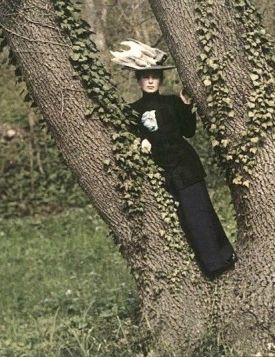“Good evening, my lords.”
She forces her voice to be smooth, her hands to fold meekly at her waist. This temple is dark, a pocket of ebony beneath the turquoise jewel of the Nile; she knows they cannot see her face, and does not bother to hide her snarl.
The men file in, their linen robes blindingly white in the dimness. The braids of their wigs hang like tiny black chains around their faces. Gold, alabaster, and lapis lazuli weigh down their wrists, making each motion slow and pensive. Though she is Queen, she wears no jewelry. Her white shift is simple and loosely tied, like the garment of any Nile peasant woman, ready to be thrown aside in an instant if its wearer should chose to swim.
Perhaps it is because of her plainness, or because they cannot see her face, that her guests enter without bowing. They take their places on the cushions around the banquet table and peer into the darkness with large, black-rimmed eyes, eyes like the openings of tombs. She follows their gaze; they look as one, first to the doorway beyond its flight of stairs, then to the squat columns lining the room like twin rows of soldiers. Finally, their eyes brush across the grate set in the wall behind her. It is, they think fearfully, the only source of air for this chamber; and yet it gives no breeze.
The Queen claps her hands, and servants emerge from the shadows behind the columns. Her guests bristle, reaching for eating knives and daggers, but the boys and young women are unarmed. They carry baskets of leeks and melons, peaches and almonds, pears and figs. As the food is laid on the table, the Queen fold her hands and waits.
No one moves. Finally, a voice breaks the stillness.
“Will you not eat, my queen?” It is the priest of Horus, a small man with fingers curled like a scorpion’s sting, making him look constantly greedy and clutching.
The Queen smiles and raises a fig to her lips.
Seeing that it is not poisoned, the men begin to eat.
After a few moments, the servants depart. The youngest guest, a scribe with sculpted lips and ink-stained fingers, turns to the Queen.
“I must confess surprise at having received your invitation, my queen. I had thought us enemies.” Around the table, other guests echo the sentiment.
“I bear you no ill will,” the Queen says. Her face is in the light this time; she forces it to mold to her lie. “I have been in mourning for my brother these past long months, and slow to meet with the men he trusted so well, for fear of being vividly reminded of him and brought to further sorrow.”
A look passes between the men; she pretends not to notice it.
“We are grieved to learn of Pharaoh’s passing,” the scribe says. “You can only imagine our pain when we heard that lies were being brought to your ears, accusing us of his murder.”
The priest of Horus pauses as he picks seeds from a pomegranate, turning to the scribe with a scowl. The scribe lowers his head; he fears he has said too much.
“He trusted you so well, I would not have thought to accuse you myself,” the Queen replies. “Though I cannot deny you have benefited from his passing…oh, but that is cruel of me. If anyone has gained by Pharaoh’s death, surely it is I. But come, this banquet is meant as a peace offering. Eat, my lords, and drink to my brother’s memory.”
They raise a toast to the dead man. She drinks the taste of blood and tears.
Talk turns to other things; hunting and farming, the new tribute taken from southern Kush, great deeds preformed and beautiful women loved—real or imaginary, she does not ask. Her thoughts have not left Pharaoh. When they speak of the hunt, she remembers him, glorious astride his massive stallion. When they speak of tribute, she remembers the day he set a string of Persian turquoise beads around her neck. She was only a child then: he was already Pharaoh: but he had presented the gift to her as he would to the most elegant Queen in the world.
Her fingers travel to her bare throat. She remembers the weight of the necklace, sighs softly, and lowers her hand.
It grows late. The food dwindles, as does the wine. The Queen stands suddenly and raises her goblet, calling again for a toast.
“To my brother,” she says. “A better man than all of us.”
He taught her much. She only wishes, as she finishes her wine and starts toward the staircase, that he had taught her mercy.
The men at the banquet table are drunk. They hardly notice her leaving; they do not hear the click of the lock as she closes the door behind her.
They do not notice the grate, or the slow trickle of water running down from it, or the faraway pounding of the Nile as it rushes over their heads.
Friday, March 01, 2013



I first learned of Nitocris from a brief mention in H.P. Lovecraft's "Under the Pyramids". I have been intrigued by the story, and enjoyed finding it fleshed out as you have done here.
ReplyDelete